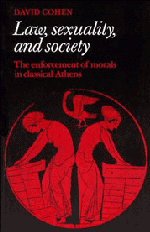Book contents
- Frontmatter
- Contents
- Preface
- 1 Introduction
- 2 Models and methods I
- 3 Models and methods II
- 4 Public and private in classical Athens
- 5 The law of adultery
- 6 Adultery, women, and social control
- 7 Law, social control, and homosexuality in classical Athens
- 8 The prosecution of impiety in Athenian law
- 9 The enforcement of morals
- Bibliography
- Index
4 - Public and private in classical Athens
Published online by Cambridge University Press: 03 May 2011
- Frontmatter
- Contents
- Preface
- 1 Introduction
- 2 Models and methods I
- 3 Models and methods II
- 4 Public and private in classical Athens
- 5 The law of adultery
- 6 Adultery, women, and social control
- 7 Law, social control, and homosexuality in classical Athens
- 8 The prosecution of impiety in Athenian law
- 9 The enforcement of morals
- Bibliography
- Index
Summary
Although the notion of “privacy” might appear more immediately relevant to a discussion of social control and the enforcement of morals, for a number of reasons this chapter initially focuses instead upon the complementary opposition of “public and private.” First, the contemporary definition of the problem in terms of the nature and boundaries of “rights to privacy” or “individual autonomy” reflects preoccupations characteristic of modern liberalism, whereas ancient societies are commonly held not to have possessed concepts of rights and individual autonomy. Further, when we examine the recent judicial cases and the legal and philosophical secondary literature, we find a marked inability to agree about the nature and status of privacy or rights to privacy. Thus a prominent scholar in this area, in writing about this definitional confusion, identifies five major categories of definitions of privacy, all of which, he argues, are completely misguided. By proposing yet another he is not likely to have resolved the underlying difficulties.
For these reasons, rather than taking an abstract definition of privacy as a starting point, I will begin instead with a dichotomy conceptually prior to privacy: the contrast of the public and private spheres. Here we run little risk of entirely imposing modern categories upon the ancient evidence, for we find the antithesis of the private (idios) and the public (demosios) everywhere in classical Greek literature from Homer onwards.
- Type
- Chapter
- Information
- Law, Sexuality, and SocietyThe Enforcement of Morals in Classical Athens, pp. 70 - 97Publisher: Cambridge University PressPrint publication year: 1991
- 1
- Cited by

